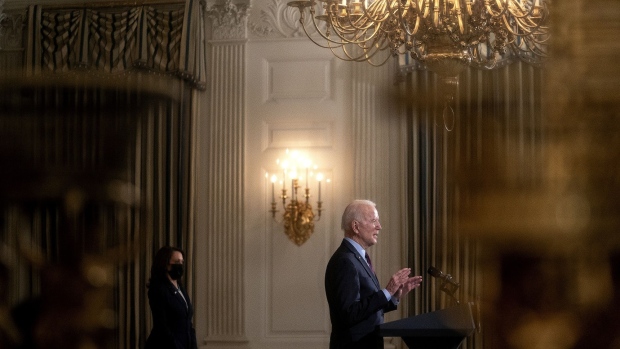Feb 26, 2021
Biden’s Virus Relief Plan Threatens to Trigger Medicare Cuts
, Bloomberg News

(Bloomberg) -- President Joe Biden’s $1.9 trillion coronavirus relief package would trigger cuts to Medicare and other programs early next year unless Republicans agree to a waiver — a hurdle that could give the GOP leverage over Democrats’ slim majorities.
The Congressional Budget Office said in a letter Thursday to House Minority Leader Kevin McCarthy that Medicare would face a $36 billion cut, and as much as $90 billion in other programs would be slashed.
The spending cliff is entirely of the Democrats’ making. Under the 2010 Pay-As-You-Go law passed by Democrats and signed by then-President Barack Obama, spending increases and tax cuts that add to the deficit — like Biden’s plan — trigger automatic cuts the following calendar year. It takes 60 votes in the Senate to declare the new outlays an emergency and avoid the cuts, which means Democrats would need 10 Republicans.
Democrats are already plotting ways to turn off the Paygo trigger, according to a Senate Democratic aide who said the most likely scenario would be to attach a waiver to a future must-pass spending bill. That would effectively dare Republicans to shut down the government or go along.
Fiscal Responsibility
Under the Paygo law, Medicare cuts are capped at 4% of that program’s outlays, and most other entitlements like Social Security and Medicaid are exempt. Spending on other programs — including some popular farm subsidies long supported by Republicans — would be at risk of being completely eliminated.
According to the CBO, there actually aren’t enough mandatory programs subject to the Paygo sequester to fully offset the deficit impact of Biden’s $1.9 trillion virus-relief bill. That means it would be impossible to fully implement the cuts required by the Paygo law, the CBO said.
Progressives are pushing to repeal the Paygo restriction altogether, which was championed by moderate Blue Dog Democrats in 2010 to demonstrate their fiscal responsibility. But since then, it has been waived repeatedly by large bipartisan majorities for trillions in spending increases and tax cuts — including for the 2017 GOP tax overhaul.
In that case, the Senate voted 91-8 then to prevent the tax cuts from triggering the Paygo law, with Senator Susan Collins, a Maine Republican, leading efforts to pass the waiver.
Zach Moller, a former Senate Budget Committee aide and now the deputy director of the economic program at Third Way, a centrist think tank, said that while the potential Paygo spending cliff is a real concern and Republicans could try to use it to their advantage, it shouldn’t be a priority for Democrats right now.
“They’ve got to save the economy first before they worry too much about statutory Paygo,” he said.
‘Hostage-Taking’
Moller said Republicans could face political blowback if a Paygo waiver is attached to a must-pass spending bill and Republicans threaten to shut down the government to enforce cuts to Medicare and crop supports. But he said he’s not sure what Republicans would ultimately do.
“Nothing explodes until it explodes,” he said of the Paygo law’s sequester, which has never been deployed. Pointing to other statutory spending constraints now routinely used as leverage, he said, “we never thought the debt limit was going to be a hostage-taking issue.”
There is at least one workaround that wouldn’t require Republican support. Democrats could include instructions in next year’s budget to postpone the cuts for another year. That could go through the budget reconciliation process that only needs 50 votes in the Senate.
However, that temporary solution would have to be passed year after year and would be at risk if Democrats lose their congressional majorities.
©2021 Bloomberg L.P.


